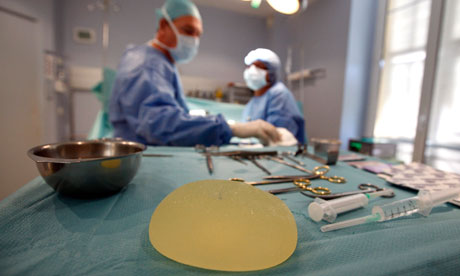
The health secretary hit out at private healthcare firms for providing little or no information on how many French-made PIP breast implants have ruptured in Britain, despite the huge public concern aroused by the unfolding scandal.
Andrew Lansley should on Thursday receive data from cosmetic surgery groups detailing how many implants have ruptured since they were fitted in 2000-2010.
He has so far said that evidence about the French-made implants' safety does not require their automatic removal, but ministers will announce by the end of the week whether they are changing their advice to the more than 40,000 British women fitted with PIP breast implants.
Confusion has arisen because while the sector's trade body has said the rupture rate was 1%-2%, Transform – one of the country's biggest cosmetic surgery groups – said that 7% of its patients' implants had burst, though that was among 108 women.
"Some of the providers, as of yesterday, had not provided any data at all, many had, some had provided what on the face of it looks quite good data, [and] others what appeared to be very poor quality [figures]," Lansley said.
He added that all the clinics should deliver reliable, consistent data so that an expert advisory group headed by professor Sir Bruce Keogh, the NHS's medical director, could recommend to ministers by the end of the week what advice they should give women.
The group, convened last weekend by Lansley in response to alarm that the failure rate may be higher than originally thought, met on Wednesday for two hours for the first time to discuss the situation.
The British Association of Aesthetic Plastic Surgeons (BAAPS) says rupture rates are irrelevant and that all the implants should be removed on safety grounds. "The point is not so much the rupture rates but that the quality of the silicone in these implants is not of medical grade. Therefore the implants are not fit to be implanted into humans. They are defective, they are sub-standard," said Fazeh Fatah, the president of BAAPS and member of Keogh's expert group.
"We have reached a point and the level of anxiety is such that there should be clear advice over what is the right course of action for women to take," Fatah added.
Diane Abbott, the shadow public health minister, backed the surgeons' calls: "I am pleased to see the health secretary taking a stronger line today to support women potentially affected. But he must not focus extensively on the rupture rate, but also on the potentially dangerous contents of these implants given what we have heard from France on fuel additives."
All women given a PIP implant should be offered a free consultation with a doctor once the results are known, while private firms should urgently remove, free of charge, any implants that have burst and reimburse the NHS for any operations it has carried out, added Abbott.
Nuffield Health, a not-for-profit private healthcare provider, has pledged to remove implants from any of its patients, whether they have proved faulty or not, to give women peace of mind. It has already taken them out of two of the estimated 150 women who had them implanted after they developed "complications". Removals, which cost about £3,500 each, would happen "for any clinical reason and this could be simply psychological. It will be done on an individual basis", the firm said.
Dr Andrew Jones, the group medical director, said Nuffield Health stopped using PIP implants in 2010, when concern about them first emerged, and wrote then to all its patients to offer them a consultation. "We will be writing to our patients again this week to ask them to contact the hospital in which they had their treatment if they have concerns or are suffering from any complications from their previous surgery. Should any patients require clinical investigation or further surgical treatment, including the removal of the PIP implants due to clinical need, we will meet the costs incurred," said Jones.

